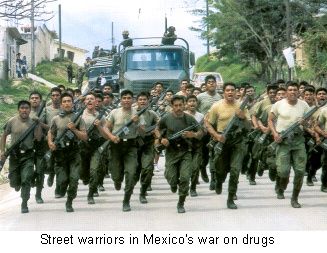Nearly 50 candidates and public figures have been assassinated in the run up to Mexico's 2010 state elections. Former presidential candidate Diego Fernà �ndez de Cevallos, major leader of the ruling PAN party, was kidnapped on May 16 and has not been heard from since. Three days ago, Rodolfo Torre, the odds on winner for governor in the state of Tamaulipas, was murdered in a highway ambush. Torre's murder represents the highest ranking politician of the 50 assassinations this election cycle.
The political murders by the drug cartels are not focused on one party. The Los Angeles Times suggested that the goal may be to create chaos and elevate the drug cartel control over the entire Mexican political system.
The Mexican drug cartels also sent a message to the United States in March when a Ciudad Jaurez U.S. Consulate worker (across from El Paso, Texas) was gunned down. The leader of a cross border gang was just arrested. Authorities suspect the hit was motivated by unequal distribution of U.S. visas to a rival gang.
The bottom line nature of the assault by drug lords may quickly create an environment where investment in Mexico drops quickly and significantly. In a bulletin from a leading investment firm to clients, a consultant said:
"Continued assassinations of members and associates of the federal government threaten the rulabilily of Mexico, as the continued casualties of a partisan dirty war weaken the remaining institutions of civil society in many areas."
When rulabilily is questioned, businesses lose investors and citizens lose their jobs. This would only worsen an already deteriorating economy and further diminish the average citizen's standard of living. Half of Mexico's 100 million people live in poverty.
The Ruling Party's War on Drugs
Mexican President Felipe Calderà �n of the conservative PAN Party was elected amidst a controversy in 2006 election. Rival Andrà �s Manuel Là �pez Obrador seemed headed for victory until last minute changes in election results gave the nod to Calderà �n. There were charges of election fraud and three million-person-plus demonstrations in Mexico City demanding a thorough recount. European Union and U.S. authorities endorsed the election and that was that.
Calderà �n was soon faced with the power of Mexican drug cartels, which began growing exponentially. Total revenue for the nine leading cartels was estimated at grater than $30 billion for 2007. Today it may be at three times that figure.
As income grew, the stakes of political power also expanded. The cartels used kidnapping and murder against public officials to gain more favorable terms for their operations. Then the cartels began killing each other and politicians bought by opposing groups. Mexican citizens were often caught in the cross fire.
Calderà �n's response was to dispatch troops to fight cartel gunmen in the streets of Mexican cities throughout the nation. Major shoot outs became common place and accounted for a share of the estimated 22,000 deaths in Mexico's drug war. In the mean time, well known drug lords were treated like celebrities.
Speaking anonymously, one Mexican observer suggested the following. If President Calderà �n really wanted to get at the heart of the drug problem, he could just follow Mexican television the next time they cover a drug lord wedding by helicopter.
Mexico's army has a big lead in body count for the street confrontations over the past two years but the nation's political system is now under unrestrained assault by the cartels.
U.S. Involvement and Stakes
(Note: You can view every article as one long page if you sign up as an Advocate Member, or higher).





